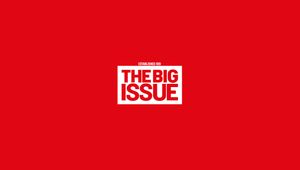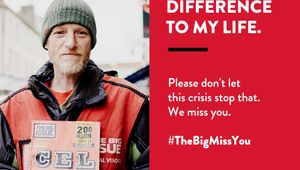
My Biggest Lesson: Holly Gordon

Holly is a hybrid creative, and Fox + Hare’s resident art director. When she's not working, you can find her playing football for Sirens FC or working her way through her growing spreadsheet of London restaurants.
The idea of “getting out of my comfort zone” has been a consistent theme throughout my career, from ad school to today, but it took a bit of time and the right circumstances for me to actually listen to it.
I was early in my career, thinking about proactive creative ideas, when my friend Gabby and I started looking into the issue of period shame in sport, and its impact on women and girls from school teams to professional athletes.
We co-created a campaign called #AddressTheDressCode, which aimed to change the narrative around menstruation in sport, taking that advice to “get out of your comfort zone” and putting it into the real world.
#AddressTheDressCode came out of a casual conversation I’d had with Gabby about the ridiculous number of girls who drop out of sport at such a young age due to period shame.
She comes from a background in tennis, I’ve got a background in football, so we knew the pressure of growing up as a girl trying to play sport. But the more research we did, the more we realised the scale of the problem - not just young girls, 78% of whom will drop out of sports because of period shame, but professional tennis players and footballers talking about it affecting them too.
I was only 27 when we started the campaign - but the agency I was part of at the time really encouraged us to develop and pursue our own proactive creative ideas, so there was lots of support to take it from an idea to something real.
I was quite new to the industry, in a sense, because I’d left ad school just before covid: things were just starting up again, I’d had a few placements and had worked out what sort of creative work I liked, but was still looking to prove myself.
I’d been repeatedly told by tutors, friends and mentors that stepping outside my comfort zone was important, but it took a while until I actually believed it to be a good thing, or had a chance to put it into practice. But when #AddressTheDressCode came along, I had the confidence to really commit to it.
Gabby and I decided that the place to start the campaign was with Wimbledon, because it’s got one of the strictest dress codes in world sport: their rules have been in place since the Victorian era, but in some ways they’re even more restrictive now than they were 150 years ago.
We spoke to a number of charities to see if they’d partner with us, but they were really scared of losing their funding if they stood up to a huge institution like Wimbledon. We realised we had to figure out how to do things on our own - stepping even further outside our comfort zone. But that just spurred us on, with the support of senior creatives.
I was probably quite safe with my work for a long time, which I think is a hangover from my graphic design days. Being protective of my work and myself was obviously doing me a disservice and I’m grateful that I was encouraged to take risks.
I will always be grateful for the support of Amy Falsey and Jacob Halström at The Or, and their emphasis on making work that’s not just effective, but fun too.
That emphasis on fun relieved the stress of running this big campaign single-handedly as a young creative: of course the details matter, but it’s also a reminder not to lose your mind over things, and just focus on making work that you love, and which has an emotional connection to the world around you.
I’m also really grateful to Nathalie Gordon, Liv Amato-Pace, Katherine Gritten and my friends for their support and advice.
I think #AddressTheDressCode worked so well because it was the right message at the right time.
Interest in women’s sports is growing, and we’re becoming more open about discussing issues like menstruation, so it was obvious that things needed to change. Society can’t keep sticking its head in the sand forever.
Also, we really cared about the issue, and were determined to find a way to make things happen. The policy just had to change. In terms of my creative work, that made me more comfortable taking risks, because I knew that I was working on something I really believed in.
And then, of course, the fact that people responded so positively helped make it unstoppable: when you have professional players and Judy Murray agreeing with you, and Lorraine Kelly inviting you onto her sofa, it becomes very hard for anyone to ignore what you’re saying!
I’m more confident in my skills and my ideas than I ever thought I would be.
Seeing our campaign lead to Wimbledon changing their rules made me believe that anything’s possible. Creative work can change the world: we’re obviously here to sell stuff, on one level, but we can also change how people think about things.
I think being encouraged to get out of my comfort zone has led to some of the best parts of my career. It’s made me less afraid to make mistakes, and to speak up for my creative work.
I don’t think I’ve re-evaluated this advice that much, it’s more that I’ve used it as a consistent reminder to myself: nothing happens if I play it safe.
No matter where you are in your career, you have to take risks and trust yourself to create work that really connects with people.
I would always encourage people to step out of their comfort zone, even when it’s scary.
I know from experience, it’s sometimes not an easy thing to hear but it feels a lot more possible when you have a good creative department/mentor backing you. And from my experience, help is always given if asked for.
Recently, my colleague asked me for help on a short-notice brief for a big prospective client: it was a bit scary, and they didn’t really know where to start. I think they felt a lot like Gabby and I felt when we started #AddressTheDressCode.
So I just dug into that same reserve of self-confidence, and helped my colleague get stuck in, find something that worked, and get it up and running.
Sometimes, the most important thing - whether you’re 100% in your comfort zone or not - is just having the confidence to back yourself.













